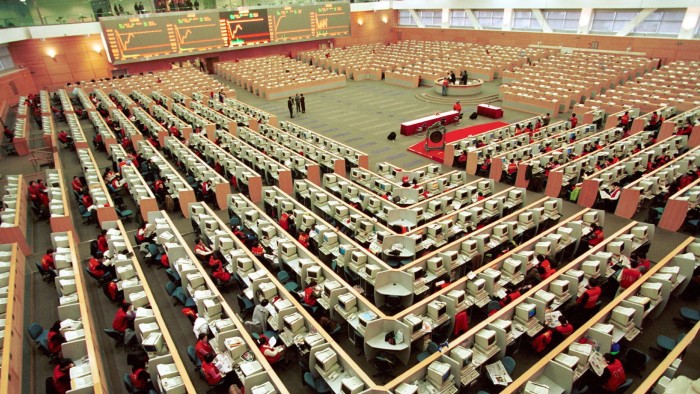From recapitalising rural banks to propping up the stock market, Central Huijin, an arm of China’s sovereign wealth fund, has supported the country’s financial system since its launch two decades ago. But over the past year, the scale of its interventions has thrust it into the spotlight.
Central Huijin’s holdings of exchange traded funds soared past Rmb1tn ($140bn) in 2024, a seven-fold increase year on year, as the government ordered stimulus measures aimed at boosting the economy.
Beijing has made clear its desire to build bigger financial institutions to help its already state-dominated financial sector navigate economic and market turmoil. Central Huijin, with both its direct buying and vast portfolio of firms, is a key component of this initiative.
During the escalation of the trade war with the US in April, Central Huijin openly pledged to support markets and, for the first time, described itself in a statement as a member of the “national team” of prominent state-backed investors in the country’s markets.
“Central Huijin is obviously being asked to play a big role,” said George Magnus, a research associate at Oxford university’s China Centre.
“It will be called upon more and more to intervene in the financial sector and the stock market as China adapts to the reality of higher non-performing loans, tighter credit conditions, and weaker asset prices,” he added.
Central Huijin is also a crucial tool as the government reshapes a sprawling financial sector that remains largely closed off from the outside world.
“Huijin is becoming a strategic co-ordinator,” said one Beijing-based policy adviser. “It’s a convenient tool for the state to lever when it needs to tighten its grip on vital financial resources.”
Since its launch in 2003, the fund has historically acted as the government’s lender of last resort in opaque rescues of regional banks. It also holds controlling or strategic stakes in major lenders, such as ICBC and China Everbright, as well as the troubled insurance units spun off from Anbang, a Chinese financial conglomerate that entered bankruptcy proceedings in 2024 after years of struggling with insolvency.
The fund became a fully-owned subsidiary of China’s sovereign wealth fund, China Investment Corporation, in 2007.
Following a sweeping leadership reshuffle and last September’s stimulus move, the fund has significantly broadened its portfolio, going deeper into ETFs and expanding across the financial system.
It is now led by Zhang Qingsong, 59, a former central banker with three decades of experience in China’s financial system. He also held senior management posts at lenders such as Agricultural Bank of China and Bank of China, which gave him deep familiarity with Huijin’s expansive portfolio.
In February, the Ministry of Finance transferred its controlling stakes in China’s three largest bad-debt managers — Cinda, Orient and Great Wall — to Huijin, at no cost.
Its total assets under management amount to $1.1tn as of June 2024, according to company filings, but it also has stakes in a portfolio of state financial institutions with total assets of at least $29tn, according to Financial Times calculations — a huge proportion of the country’s entire financial assets.
Huijin did not respond to a request for comment.
Although April was the first time Huijin had publicly declared itself as playing in the position of state intervention fund in the “national team” — or in the language of China’s market regulator, as a “quasi-stabilisation fund” — it has acted similarly in the past to help set a floor for China’s stock market during times of distress.
It previously played the same role propping up shares during the market rout of 2015, investing an estimated Rmb1.2tn in more than 900 companies to prevent a meltdown. It has exited many of those holdings since 2021, though it still held stakes in 165 listed companies as of the first quarter of 2025, according to the Wind financial data service.
But from early 2024, its focus shifted to increasing its holdings of exchange traded funds tracking major indices, which avoided issues arising from single-stock purchases.
The buying intensified in April following Donald Trump’s “liberation day” tariffs, when Huijin pledged to step up ETF purchases “when necessary.” An estimate from a Shanghai-based analyst not allowed to publicly speak on the matter suggests ETF purchases by Huijin in April alone may have reached Rmb200bn.
Huijin’s expanded role this year has been helped by broader co-ordinated moves from other regulators, with significant support from the People’s Bank of China. As China seeks to consolidate its financial sector, Huijin can help facilitate mergers and expedite approval times.
Its activity has also coincided with an official push for higher dividends in China, while a decline in mutual fund fees is expected to reduce its costs.
A senior executive at a Beijing fund house said that it was hard for managers to keep fees at previous, higher levels, given the “giant” inflows from Huijin.
Many analysts anticipate that an intervention fund such as Central Huijin’s would ultimately exit the market after holding positions for several years, but this could take longer than usual, given the size of purchases this time.
And, with the mainland’s A-share markets now carrying more strategic weight than they did a decade ago, and valuations still at low levels, the Shanghai-based analyst suggested Huijin and the authorities may be willing to hold positions for “20, 30, even 40 years”.
“I don’t see any near-term risk of the national team exiting the market or policy turning negative,” he said. “It is not the story at the moment.”
Read the full article here




